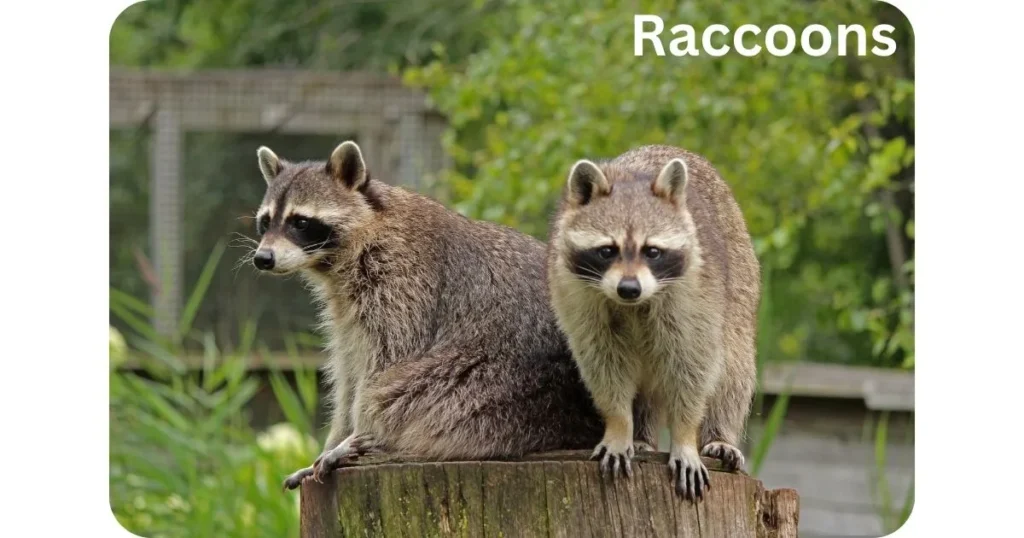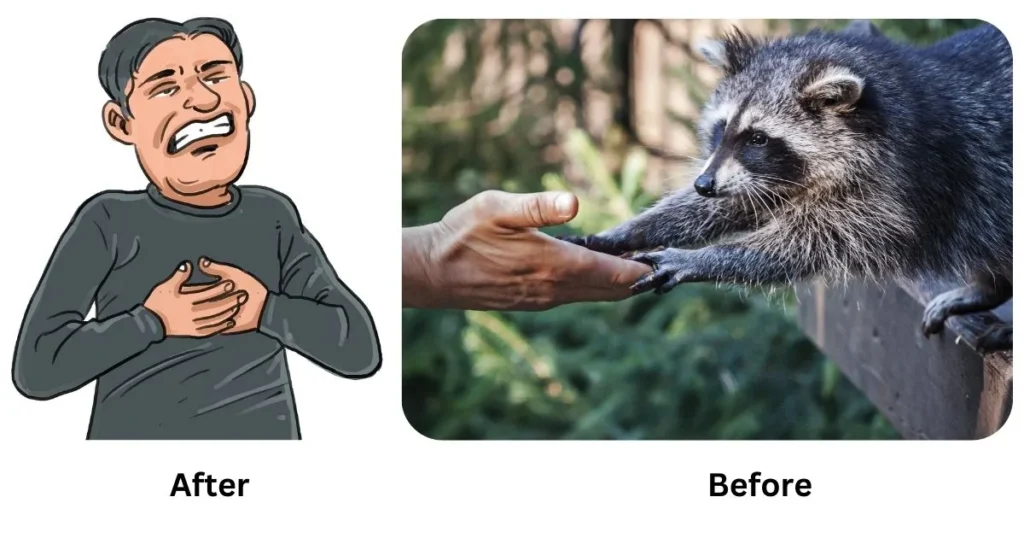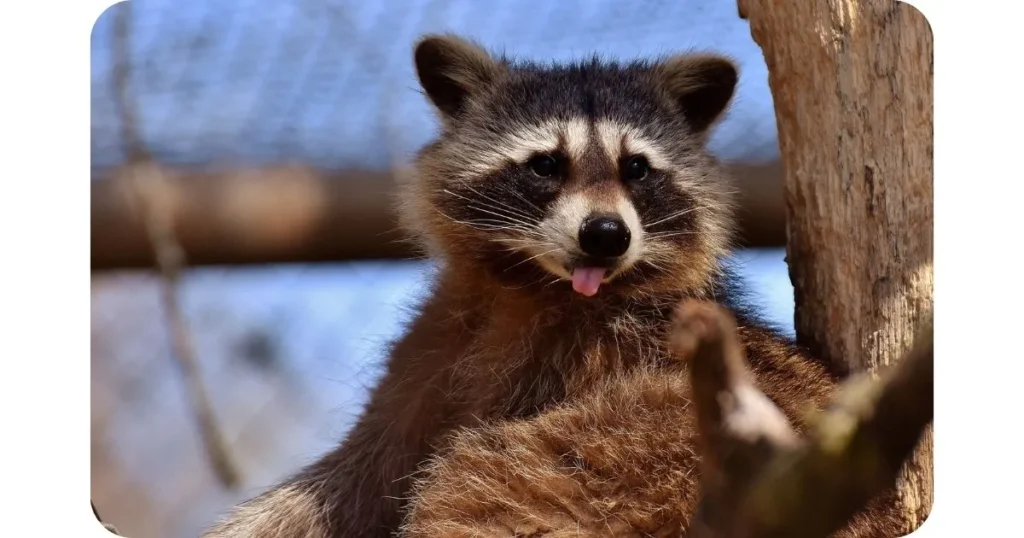Does raccoon bite? The simple answer to this question is “Yes,” because raccoons are wild animals, and wild animals are often sometimes aggressive towards humans. It does not matter what animals bite you, but if you are bitten by a raccoon or other animals, you should go near a rescue center for treatment.
This is because certain animals can carry diseases or infections that can be harmful to humans, and it is better to seek medical attention than to wait at home for a wound to heal.
Usually, raccoons are not always aggressive towards humans, and they do not wait for humans at a particular spot when they come & they will bite them. In most cases, raccoon bites occur when humans approach near their dens or threaten them.
Today, we’ll discuss the question, “Does raccoons bite?” And try to find what factors urge them to bite humans.
Does raccoon bite?
Raccoons generally bite if they feel their young are in danger or someone tries to catch their babies. In that situation, they will defend themself and will be aggressive towards humans.
It’s common sense that every action has a reaction, and when we take action toward animals, then their reaction may be fatal. Now you’re thinking, if someone doesn’t disturb a raccoon, they may still bite if we cross near them. Now, it’s not our fault.
Alright, I know this may happen when raccoons are already aggressive due to other people. It’s possible that if you come across them, they may bite.
In December of 2024, a raccoon attacked a girl named Kathleen Li occur. During the attack, Li recorded a video, which was later shared on Instagram account with the username @barstoolprinceton. In this clip, we can see Li standing at a distance from the raccoon, but the raccoon approaches her from under the fence and bites her legs.
Generally, a rabid raccoon attacks humans in most cases, but hungry raccoons also bite when they can’t find food. Caution should always be taken when we encounter raccoons, regardless of how far they are from us, because raccoons can run as fast as we can’t flee.
Do raccoon bites hurt?
Another answer is yes. Raccoon bites can be painful because they have sharp teeth and strong jaws, and their bites can cause injuries and puncture wounds. Raccoons have a total of 40 teeth, which include three incisors, one canine, two molars, and 4-premolars. They also have a strong bite force, but their bite is stronger than domestic cats and weaker than domestic dogs.
Additionally, there is a risk of infection from raccoon bites due to bacteria in their mouths. Generally, rabies is an infection that spreads when bitten by wild animals, and raccoons are considered a major source of the rabies virus compared to other animals.
From all points of view, a raccoon bite is 100% painful and hurtful, and treatment should be taken immediately in case of a bite.
In December 2022, a video went viral about a raccoon attack on a 5-year-old child who was returning home from school. The raccoon can be seen in the video running from outside the yard and biting the child’s legs.
In the meantime, the child’s mother came and saved her 5-year-old child, putting the raccoon out of the fence. Both the child and her mother were injured in the attack that occurred in Connecticut.
Can You Die From a Raccoon Bite?
While it’s uncommon, a raccoon bite has the potential to transmit diseases and cause serious infections, which could lead to severe health complications or, in rare cases, be fatal.
In February 2003, the first human death was reported that was died by rabies virus. This is the first man who died from raccoon rabies. Since February 2003, there have been several reports of raccoon attacks. Although these attacks have caused injuries to some people and children, fortunately, they have not been fatal.
What does a raccoon bite look like?
A raccoon bite may initially appear as a puncture wound with surrounding redness and swelling. Raccoons have sharp teeth, and their bites can cause injuries and the sensitivity of these injuries depends on various factors. The appearance of a raccoon bite depends on the size of the raccoon, the force of the bite, and the location of the bite on the body.
Why do raccoons bite Humans?
Raccoons may bite for various reasons, and their behavior is unpredictable. However, factors such as fear, aggression, protection of territory or offspring, illness, or feeling unsafe can influence raccoons to bite humans. Here are some common reasons why raccoons bite:
- Fear: Raccoons are wild animals, and if they feel threatened, they may bite as a defensive reaction. Some raccoons are not aggressive towards humans unless they feel safe.
- Protection of Young: Raccoons are known to be protective of their offspring. They often relocate their dens due to the availability of food sources or other threats. After receiving a threat, they become aggressive and bite to defend their dens or offspring.
- Illness or Injury: Based on some research, it has been suggested that injured raccoons are more dangerous than healthy ones. This is because sick or injured raccoons tend to act defensively, which can make them more likely to bite as a means of self-protection.
- Aggression: In some cases, raccoons may display aggressive behavior due to various reasons, such as competition for food or territory with other raccoons.
Does Raccoons bite? Final Thoughts
Generally, raccoons’ behavior is unpredictable, and in most cases, they bite humans when they are near them. However, raccoons are also famous for keeping as pets, but most wild raccoons attack humans that live near human settlements. So, if you want to be safe from the raccoon’s bite, keep your outdoors clean and safe because raccoons will come to places where they see food.
They also make dens in unused places. This mostly happens during the breeding season, which starts in January, peaks in April, and ends in June. Raccoon bites are not only painful but can also cause serious injury. Therefore, be careful around wild animals and maintain a safe distance where they cannot see you, but you can still see them.



